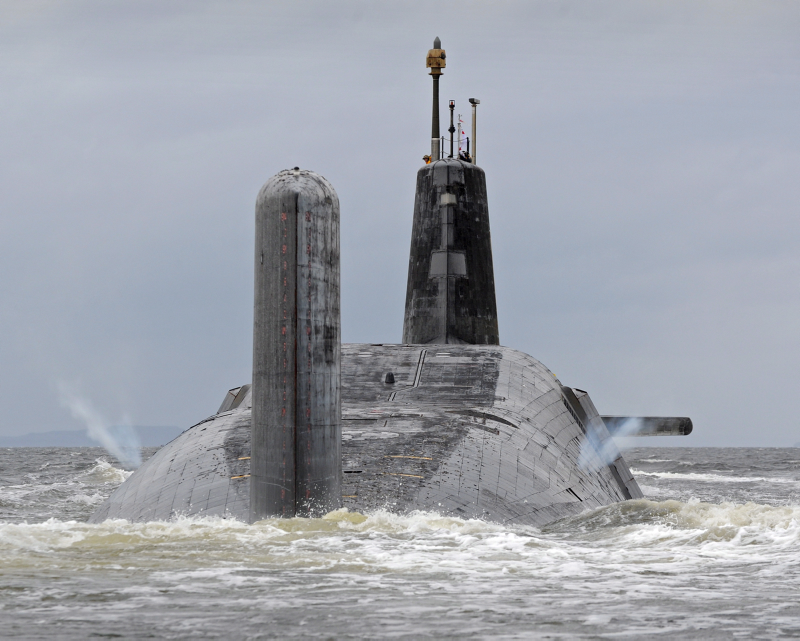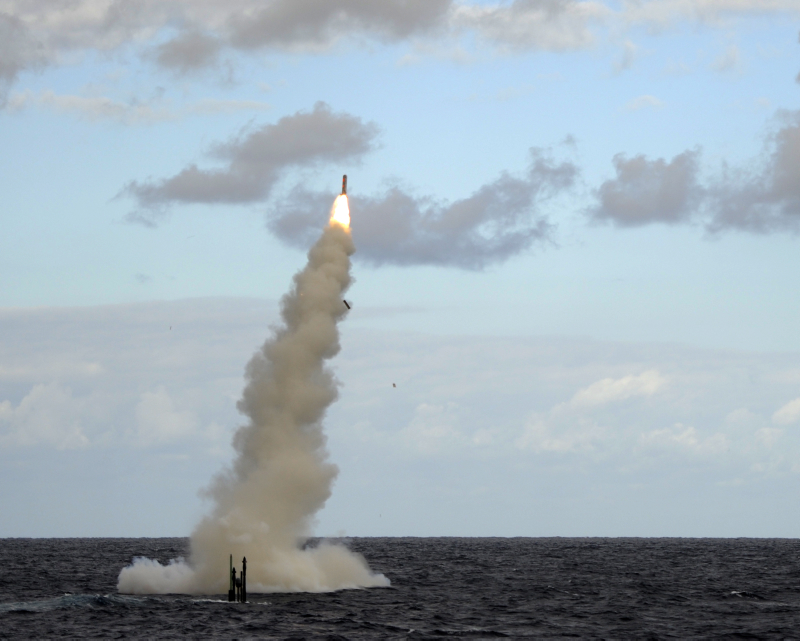
What is
Trident
Trident is
our only nuclear defence system. Trident is strictly speaking the name of the missile involved.
However, the submarines used to deliver the missiles are included in what we loosely call the
Trident System. The current decision in relation to ‘Trident’ is not about new missiles but about renewing the submarines used to
deliver Trident missiles (1).
Trident
is based on the West Coast of Scotland. The submarines are at Faslane and the
warheads are at Coulport, eight miles away.This location is important because the Scottish National Party does not
want Trident on Scottish soil.
The ‘Trident’ system in more detail
It is not an
ordinary battlefield weapon. It consists of:
- Four submarines, each twice as long as a Jumbo Jet. One of them is always out on
patrol.
- 58 ballistic missiles (Trident)
- In theory, each submarine could carry 16 Trident
missiles and each missile could carry 12 independently-targetable nuclear
warheads - 192 in all. Under a non-proliferation treaty we limit ourselves
to a maximum of 40 warheads on each submarine when on patrol.
Each warhead has a yield of around 100 kilotons, which is
around 8 times the power of the bomb that destroyed the city of Hiroshima. The
total yield of all the warheads deployed on submarines based in Scotland is
around 14.4 megatons, which is equivalent to over 1,000 Hiroshima bombs. (2)
Assuming we aimed at a ‘traditional’ enemy like Moscow,
targeting underground command centres, and assuming we are so accurate we only hit
what we aim at, 40 nuclear warheads could produce 5.4 million deaths, 4.5
million inside the city and a further 870,000 in Moscow Region. This is an
estimate of casualties within the first few months and does not take account of
long-term effects (3 p2)
There would be further
complications from the effects on water supply, food chains, weather systems,
lack of medical treatment etc. in the long term. The area would be
uninhabitable for generations.

What
is it for?
Put
simply, the idea behind nuclear defence is ‘mutually assured destruction’, or
MAD. If we own that sort of destructive power then nobody would dare to attack
us. If both sides own it then, given the consequences of a nuclear exchange,
they would be ‘mad’ to use it, so neither side would do so.
Expert
views, including senior armed forces personnel, are split between the idea that
it is irresponsible to scrap nuclear weapons and a conviction theyare now outmoded and actually harming our
defence forces by using the funds we need for more conventional defence measures.
(1, 5.2)
Why are
we asking the question now?
“A
debate and vote in the House of Commons on the general principle of whether the
UK should retain a strategic nuclear deterrent beyond the life of the current
system was held on 14 March 2007. That motion was passed … by 409 to 161
votes.”(4)
“In early 2016, a decision on taking that programme forward
into the manufacture phase ... will be taken. The Government is expected to
seek the approval of Parliament for this decision.” (1)
A recent
newspaper report suggested the decision may even be brought forward to prevent
the question of renewal becoming an element of any part of any Scottish election
debate, due in May 2016. (5) There is a long lead-in time between approving and
delivering any system. However, the new Leader of the Labour Party has already
said that, if elected, he would never use it, raising fundamental questions
aboutthelogic that underpins its existence. Would any
Prime Minister actually use it? Does any potential enemy believe they would?
Would we wish them to?
Is the question all about Trident?
In theory,
we could elect to have various kinds of nuclear defence system , but a defence
White Paper in 2006 concluded that:retaining a submarine-based system provides
the most effective deterrent; and that no credible alternative is
cheaper (6 p7)
The Trident Alternatives Review published in
2013 and the
Trident Commission
Concluding Report
2014 both concluded they could not recommend any other system as a practical
replacement. (7, 8)
Is it a simple yes/no decision?
There is no
alternative system in prospect. The Liberal Democrat suggestion of a cut-price,
scaled down or part-time version of Trident - cheaper - a “minimal yet credible
deterrent” - has not been widely supported in either of the Houses of Parliament (9, 10).
It is at present
very unlikely the vote in parliament will include such any sort of alternative.
Even if there were, the fundamental question is whether we should we own such a
system in principle. Hence, on Open Up there are only two choices: Trident; or
nothing.
Have any decisions been taken
already?
The
Chancellor, George Osborne, has already announced a £500 millionoverhaul for the Faslane naval base, where
the Trident system is housed, to make sure it is ‘fit for purpose until at
least 2067’ (11) However, Faslane is
also used as a base for conventional submarines and opinions differ on whether
he really intended to pre-empt the debate on renewing Trident.
What factors affect the decision?
The main
criteria are laid out in the arguments on the next page. They can be grouped into
three categories: practicality, morality and cost.
Not
considered is the argument that renewing Trident would be illegal, because this
argument seems unlikely to affect any vote. (7
p29)
Illegality,
it has been argued, follows from our obligations under a range of treaties and
agreements relating to nuclear weapons, especially Article VI of the Treaty on
the Non-Proliferation on Nuclear Weapons (NPT). Under that article, the five
recognised nuclear weapon states are permitted to possess nuclear weapons, but
only if they commit themselves to the principles of nuclear arms control and
eventual disarmament. However, “successive governments have insisted that the
UK’s nuclear deterrent is fully consistent with all of the UK’s international
legal obligations”. This is partly because we have been reducing our nuclear
stockpile since the end of the Cold War (which ran roughly between the 1950s
and the 1990s). By 2020 the UK will have reduced them by 65%, making it “the
smallest of all the NPT nuclear weapon states”. It is said that this keeps us
within the spirit of the law.
(1; section
3)
Sources
1 Replacing the UK's Trident Nuclear Deterrent
- briefing report in the House of Common Library number 7353, 26 October2015 - summary and full
report athttp://researchbriefings.parliament.uk/ResearchBriefing/Summary/CBP-7353
2 Scottish CND
http://www.banthebomb.org/archives/wmd/ch2stat.htm
3 If Britain fired Trident - Scottish CND
http://www.icanw.org/wp-content/uploads/2013/02/if...
4 http://researchbriefings.parliament.uk/ResearchBr...
http://www.telegraph.co.uk/news/uknews/defence/119...
7 Trident Alternatives StudyJuly 2013https://www.gov.uk/government/uploads/system/uploads/attachment_data/file/212745/20130716_Trident_Alternatives_Study.pdf
8 Trident-commission-concluding-report
http://www.basicint.org/publications/trident-comis...
9 The
Trident Successor Programme: An Update
http://researchbriefings.parliament.uk/ResearchBr...
10 http://www.libdems.org.uk/trident
11
Telegraph 17th November 2015
http://www.telegraph.co.uk/news/uknews/defence/11...
12 Diplomat
http://thediplomat.com/2014/09/why-nuclear-weapons...
13 Kings College debate mp3
http://podcast.ulcc.ac.uk/accounts/kings/KCL_War_S...
14The Myth of Nuclear Deterrence
http://cns.miis.edu/npr/pdfs/153_wilson.pdf
15 http://www.lrb.co.uk/v36/n02/steven-shapin/how-wo...
16 Guardian article
http://www.theguardian.com/commentisfree/2015/oct/...
17 Fight, fight and fight again - Progress -
Luke Akehurst -31 October 2012
http://www.progressonline.org.uk/2012/10/31/fight-...
18 http://www.lrb.co.uk/v33/n09/rw-johnson/living-on...
19 The Trident question - LRB - Christopher
Prendergast 25 September 2015
http://www.lrb.co.uk/blog/2015/09/25/christopher-...
20
http://www.psr.org/chapters/washington/peace-nucl...
21 Independentarticle by David ConnettSaturday 26 December 2015http://www.independent.co.uk/life-style/gadgets-and-tech/news/trident-nuclear-deterrent-under-threat-from-underwater-drones-expert-warns-a6786946.html
22 Guardian article http://www.theguardian.com/uk/2010/may/20/trident...
23 http://www.basicint.org/publications/paul-ingram-...
24 BBC news 2015
http://www.bbc.co.uk/news/uk-politics-13442735
25 Independent article Sean O'Grady 9th November
2015
26 National Security Strategy and Strategic
Defence and Security Review 2015; May 2011 Parliamentary Report
https://www.gov.uk/government/uploads/system/uploa...
27 Daily Mail
http://www.dailymail.co.uk/news/article-2259937/Mo...
28 Mirror
http://www.mirror.co.uk/news/uk-news/ministry-of-d...
29 Wings over Scotland
http://wingsoverscotland.com/the-nuclear-deterrenc...
30 BBC 2008http://news.bbc.co.uk/today/hi/today/newsid_7758000/7758347.stm
31 Independent article
http://www.independent.co.uk/voices/commentators/d...
32 CNDhttp://www.cnduk.org/images/stories/briefings/missiledefence/UK_US_reliance.pdf
33 Trident: the
British Question Ian Jack Guardian Thursday 11 February 2016 http://www.theguardian.com/uk-news/2016/feb/11/tr...
34 Guardian article http://www.theguardian.com/uk/2010/may/20/trident...
34
35 "Progress
Backing Trident renewal - Rowan
Ree 5 November 2012 http://www.progressonline.org.uk/2012/11/05/backi...
36 London
Review of BooksVol. 33 No. 9 28 April
2011pages 32-33 R.W. Johnson
http://www.lrb.co.uk/v33/n09/rw-johnson/living-on...
37 Independent
article Sean O'Grady 9th Novem,ber 2015
38 Wings
over Scotlandhttp://wingsoverscotland.com/the-nuclear-deterrence-faq
39 Labour’s
Trident debate needs to be based on facts -
John Hutton and George
Robertson, Guardian, 22 February 2016
http://www.theguardian.com/commentisfree/2016/feb...


